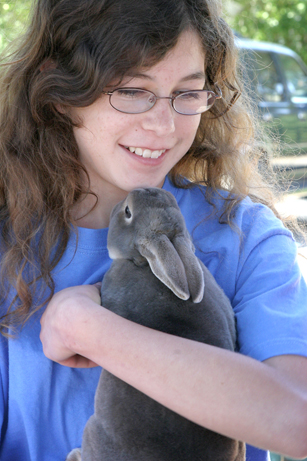
Heifer International teaches sustainable agriculture
worldwide
The Aromas 4-H club members know a thing or two about raising
animals, and the world is better off for it.
Heifer International teaches sustainable agriculture worldwide
The Aromas 4-H club members know a thing or two about raising animals, and the world is better off for it.
“One animal can go a long way,” said 16-year-old Jay Smith, a member who has been involved with 4-H for seven years. “It can multiply and go a long way. It’s not just one day’s food.”
Smith learned his lessons about the value of animals from raising goats and chickens. Several years ago when he learned about Heifer International, a nonprofit organization that works with communities around the globe to teach sustainable living through livestock and agriculture, Smith knew how far a little can go.
When a donation is made, instead of turning the money over to those in need, or purchasing food, Heifer will purchase livestock and other agriculture products to help families in need begin a sustainable living.
While his family donated to the organization, Smith decided to approach his fellow 4-H members about raising money for Heifer last year.
He made a presentation about the organization and proposed creating a committee to start fund-raising for Heifer. Last year, the group raised $1,200 to purchase animals through Heifer International for programs around the world, which includes projects in rural South Africa, Asia and even in urban areas in the United States.
Since its inception in 1944, Heifer International has helped 38 million people worldwide through their education efforts and programs.
“We had this whole long list of things we wanted to buy,” Smith said. “We got cows, water buffalos, goats and sheep.”
The group had enough money to purchase 10 animals, and once Smith read the list at a 4-H meeting, interest among members grew. The group manned a booth at Aromas Day Aug. 27 for the second year in a row to boost their fund-raising efforts.
While they collected $350 at the one-day event, the members are still collecting donations individually. The group’s grand total has yet to be calculated, though Smith hopes he and fellow 4-H members will collect more money than they did last year.
For each dollar collected, 75 cents goes to livestock, agriculture and education of communities with Heifer International programs.
The group originated in the 1930s when founder Dan West traveled to Spain during the Spanish Civil War as a relief worker and was struck by the hopelessness of offering daily rations out to hungry children. After returning, he started “Heifers for Relief” which later became Heifers International. West believed by teaching families how to raise livestock they would be “spared the indignity of depending on others to feed their children.”
Since the first shipment of 17 heifer cows left Pennsylvania for Puerto Rico in 1944, the mission of the group has stayed the same, though it has grown to a worldwide operation.
“A big piece of the work is education,” said Christine Volkmer, a spokesperson for Heifer. “There is nine to 12 months of education before animals even arrive.”
Communities approach Heifer and apply to have a project in their village or neighborhood.
“Word travels through villages,” Volkmer said. “We look at what resources there are and if we can go in and effectively work with the group.”
Before livestock can be brought in, groups take leadership training and learn basic veterinary skills that will keep the animals healthy. They learn about growing crops that people can eat as well as crops for the animals.
The philosophy of Heifer is that people, land and animals are all connected.
“It is important to improve the land and water quality,” Volkmer said. “We want to leave the least amount of footprint.”
One of the cornerstones of Heifer International is that those helped must pass on the gift.
“Passing on the gift keeps these projects sustainable and growing,” Volkmer said. “Families pass on the female offspring or the financial equivalent to other families.”
In addition to helping families support themselves, some of the programs have empowered women in regions where gender equality isn’t the norm.
“Men are involved in small businesses or might be in the military or off working in cities,” Volkmer said. “Women take on leadership. We hear back from these couples that they feel empowered.”
A project in Ecuador showcases how Heifer works. At the start of the project, one family received an animal.
“They are encouraged to first feed their family,” Volkmer said. “We teach them about nutrition, diabetes – how children learn better” when they are nourished.
As animals were born and passed along, the women of the village put together a collective fund with extra money each family made from the sale of milk or eggs. The women prioritized the needs of the community, some of which included surgery for a child with a cleft pallet and school uniforms for others.
“Those women are amazing,” Volkmer said. “Many never went to school or only went to elementary school, but they believe in group accountability.”
Heifer stays involved with each project for three years until the communities are able to function on their own.
Smith and his fellow 4-H members plan to launch a third Heifer International fund-raiser next year to help programs that are just starting out to grow into cooperatives like the one in Ecuador.
“It’s to help people to help themselves,” Smith said.
For more information on Heifer International, call 1-800-422-0474 or visit www.heifer.org.








